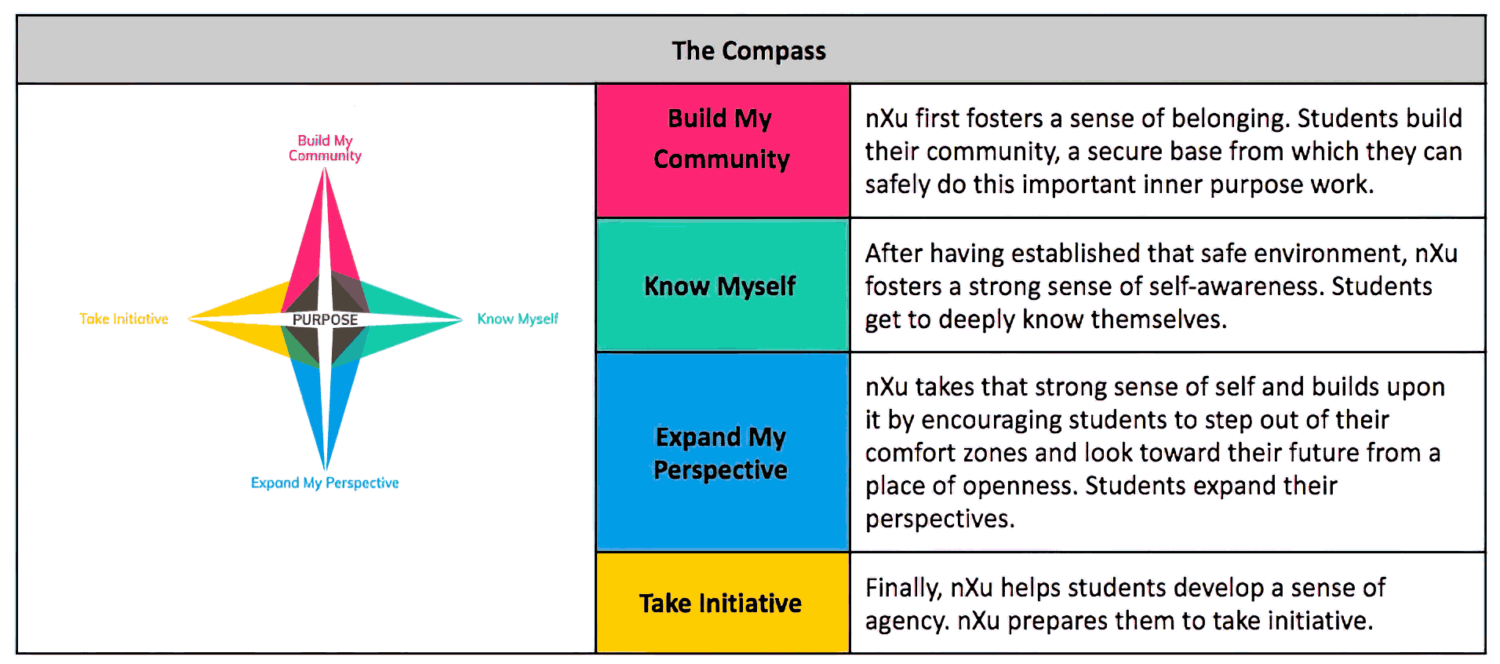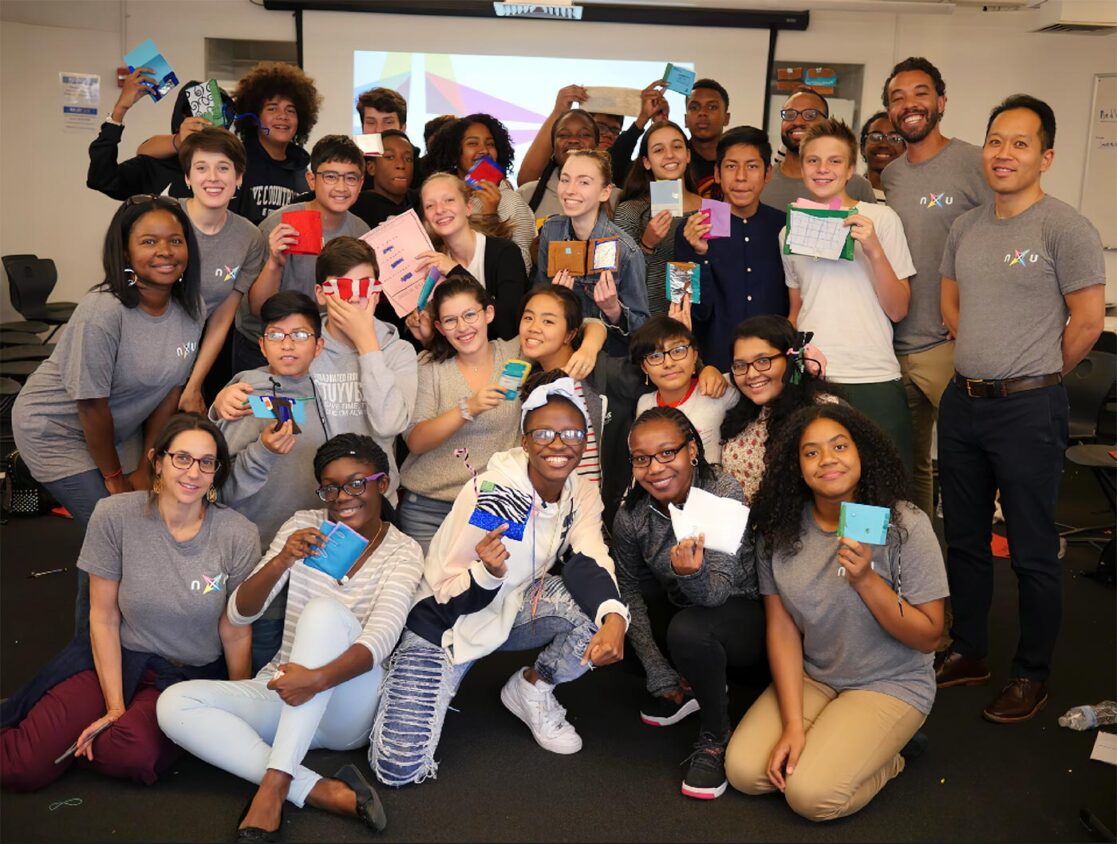How Might We Ignite Learners With the Power of Purpose?

How might we ignite learners with the power of purpose?
Imagine a learning experience that is essential for the short and long-term success of students from both low income and affluent schools, that resonates with both demographics, but that none of the students are getting, regardless of their school.
What comes to mind?

PURPOSE EDUCATION
Purpose—and the related skills and tools necessary to fulfill one’s purpose—is a fundamental human motive that is at the root of major markers of success throughout one’s life. Research suggests that youth with a strong sense of purpose experience greater physical, mental, and emotional well-being (Brassai, L. et al., 2011), and have more academic tenacity (Dweck, C.S. et al, 2014). Adults with a strong sense of purpose also experience greater life satisfaction (Bronk, K.C. et al., 2009).

Yet, purpose in students is rare. One prominent researcher laments, “most young people and even most adults don’t have a purpose in their life” (Wallis, 2018). A 2009 study involving 237 young people revealed that 17 percent of high school freshman have a sense of purpose, and 23 percent of seniors do (Moran, 2009).
To address the purpose gap in present day schooling, we at Transcend have been anchor R&D partners of nXu (www.nxueducation.org), a nonprofit serving high schoolers since the summer of 2017.
The newest research and trends in purpose education is exciting to consider.
Since nXu’s inception over two years ago, there has been growing research supporting the importance of purpose development. These developments are summarized in our research brief, “Sense of Purpose,” which is a part of our Graduate Aims Database. Thanks to a surge in the importance of purpose development, interest in purpose education has increased, and schools, districts, and even state education agencies have begun to consider purpose education more seriously. For example, Utah’s State Board of Education recently approved an aspirational portrait of a Utah public high school graduate that includes purpose as a foundational anchor. Similarly, the corporate sector has become attuned to purpose development. For example, thousands of employees of the global financial services firm, EY, have engaged in purpose development programming.
Given this backdrop, we’re thrilled at how nXu is positioning itself to meet a growing demand for purpose curriculum and programming by providing two core offerings to schools:

- Purpose Curriculum: nXu is offering its purpose development curriculum that is based on its evidence-based methodology and that is comprised of detailed facilitator manuals and related student manuals.
- Teacher Training: nXu is offering an educator training program during which participants learn about the research and rationale behind purpose development, experience nXu’s purpose development programming, and receive the training necessary to implement nXu’s purpose curriculum.
For schools interested in more substantive support, nXu is offering the following:
- Partnerships: nXu will continue to engage in deep partnerships with schools seeking more substantive support incorporating purpose development programming into the fabric of their schools.
- Outcomes & Measurement: nXu will support schools to measure the effectiveness of their implementation of the nXu curriculum within their communities.
- Direct Student Programming: nXu will continue to offer direct student programming (highlighted in this video) within schools as well as out of school that allows it to model the implementation of their purpose curriculum.
We at Transcend believe that the nXu team is well-positioned to offer high quality programming and services to schools given the intentional, community-driven manner in which they have built their organization.
From 2017 to 2019, nXu served high school students across five cities both within schools and in out-of-school environments while also seeking input from a range of constituents, from teachers to parents to community organizations. During this time, nXu developed, tested, and refined a four-phase purpose development methodology called “The Compass,” which includes the following graduate aims:

With The Compass as the northstar, nXu designed, implemented, and iterated the structures and supports needed to bring The Compass to life for students, including curriculum, pedagogy, assessment, community-building practices, continuous improvement mechanisms, partnerships, budget, operations, logistics, and more. Through this process, nXu learned two important things:
- Purpose education works: With input from researchers and our research and design team at Transcend, nXu developed and implemented an outcomes and measurement system during the 2018-19 school year which allowed nXu to validate The Compass methodology. nXu participants reported 100% more growth on assessments of sense of purpose compared to a control group of students. Further, they reported more growth on measures related to belonging, self-awareness, openness, agency, long-term goals, and college readiness. One nXu participant shared, “My sense of purpose has developed and has been expanded in a way that could not have been possible without this program. I now have a specific idea of what I want to do in my life and how I want to impact the world.” nXu also saw a measurable growth in sense of purpose among the educators who engaged in nXu’s programming!
- Purpose education can be integrated into current school models: By serving hundreds of students and adults, the nXu team has generated valuable insights into how best to develop a sense of purpose in the lives of youth and adults. This includes ways to foster key mindsets and incorporate them in content and resources, ways to identify purpose-specific “teacher moves,” and, ultimately, ways to cultivate students’ own purpose-seeking skills.
The good news is that nXu is still learning and improving The Compass model.

nXu initially launched by serving students in an out-of-school context in which it could develop and iterate most purely on its program model, and it continues to do so in the form of a fellowship program serving intentionally diverse cohorts of students in New York City, San Antonio, and Seattle. Leveraging this out-of-school programming as a learning lab, nXu has codified its methodology, curriculum, and program model and, over the last year, has started to respond to new schools’ growing interest in its work.
This past summer, for example, nXu launched a partnership with another Transcend partner, Intrinsic Schools in Chicago. nXu operated an immersive summer program which included Intrinsic students and staff members. Intrinsic students experienced a 32% increase in their sense of purpose. Equally encouraging was the fact that Intrinsic staff experienced a 15% increase in their sense of purpose. One hundred per cent of Intrinsic staff agreed with this statement: “I would recommend nXu to other educators.” As a result of the success of this summer programming, Intrinsic immediately implemented core components of nXu’s curriculum across their two campuses.
It was so helpful to see nXu staff model the implementation of the curriculum. And because nXu’s curriculum was so strategically documented, it made it easy for our staff to implement the curriculum.
Maggie Hughes, Postsecondary Designer, Intrinsic
nXu and Intrinsic are now in deep discussions about expanding their partnership into the 2020-2021 school year.
Through this partnership and other school programming, the nXu team has generated three key insights about the conditions and supports required for schools to successfully integrate nXu’s curriculum and program model:
1. The exploration of purpose requires the right setting. High school students need to feel a sense of emotional and social safety to allow themselves to fully explore their purpose in life. Thus, nXu has created a curriculum that compellingly articulates the benefits of purpose development and has developed concrete community and culture building strategies.
2. There are a variety of ways in which nXu programming can be implemented in a school. For example, some schools have incorporated nXu programming into their school day during advisory time and/or elective time, and others have opted for after-school time. At least a few schools have voiced interest in incorporating nXu into their start-of-year orientation programming. To mitigate this complexity, nXu has designed its curriculum modularly so it can be used in a range of settings.
3. The adults leading purpose programming need appropriate support and training because teaching purpose curriculum is different from teaching core academic subjects. In an effort to lessen the complexity of facilitation, nXu has developed extremely detailed and scripted facilitator manuals designed to be easily implementable by a range of facilitators, including non-nXu staff members. They are developing a training for school-based staff that will strategically prepare educators to implement their distinct and essential curriculum. They are also developing culture building strategies that enable teachers to successfully build and establish an environment that enables purpose development.
Having refined and tested its model, now nXu is intentionally expanding its reach and supporting a growing number of schools as they consider incorporating purpose programming into their schools. As the nXu team navigates the next stage of their growth, they will be focused on school partnerships that serve students from historically underserved communities and ensuring their teachers are well positioned to provide purpose programming to their students.
Through repeated, direct implementation of our curriculum, we are now well positioned to share the ‘what’ (i.e. the curriculum and program model) as well as the ‘how’ (i.e. specific guidance around implementation) which is critical to the success of any new program.”
Jabali Sawicki, Compass Director, nXu
We are motivated to support a growing number of schools to integrate purpose programming and to ensure that all students and staff are armed with a personal sense of purpose which can serve as a north star as they navigate an increasingly complex society and fast-changing world of work.
Yutaka Tamura, Executive Director, nXu
nXu aspires to make purpose development a universal high school experience and to contribute to the broader effort to address educational inequity among schools across our nation. We at Transcend are excited to continue supporting the nXu team as they prepare for this next stage of their growth and development.

For more information, please contact nXu at info@nxueducation.org.
Transcend supports communities to create and spread extraordinary, equitable learning environments.

